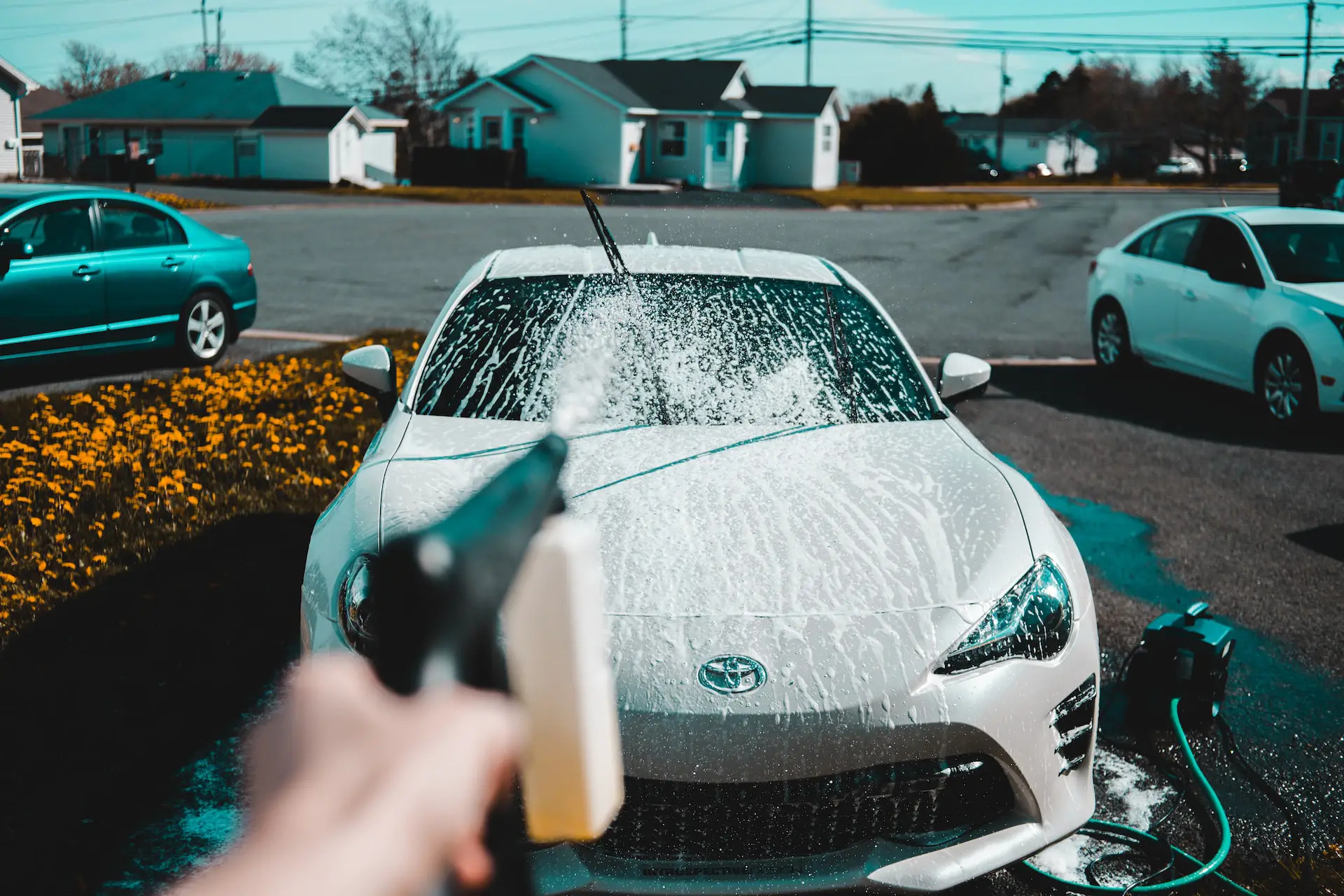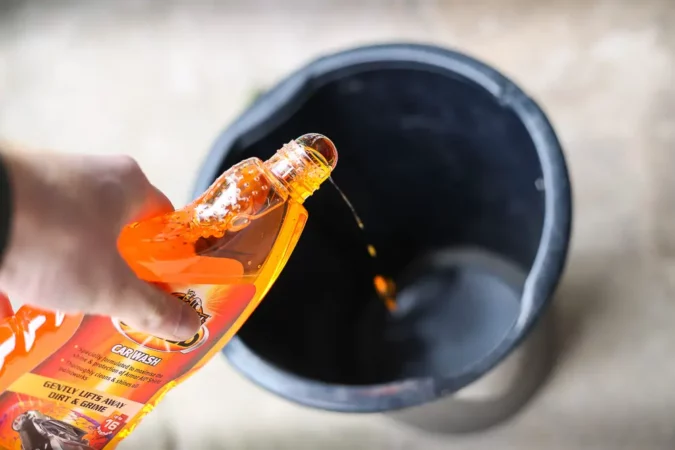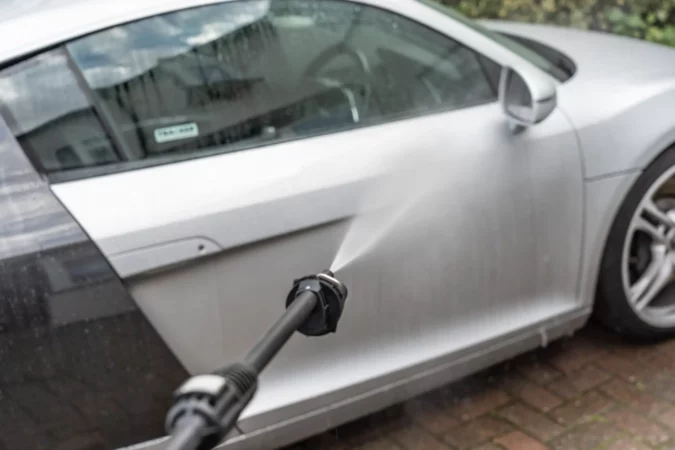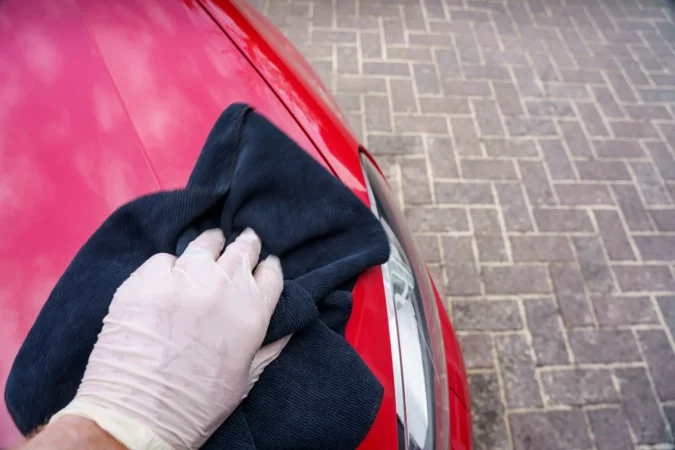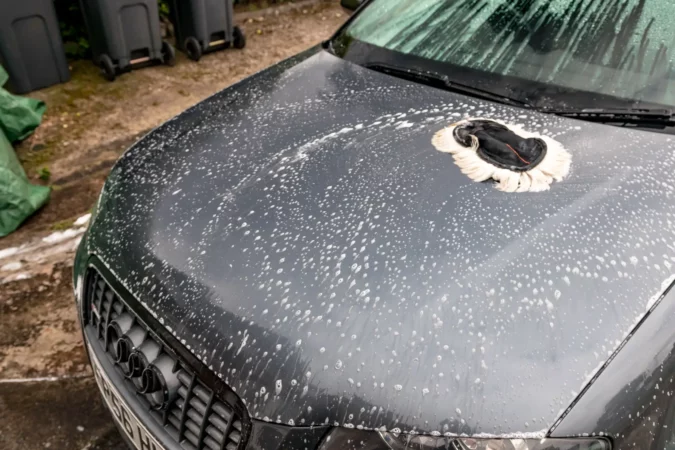Taking care of your car is just as important as driving it hard and fast. But, this is an area where most gearheads run into trouble. One question most car owners wonders are “Can I use dish soap to wash my car?” After going through this article, you’ll know the exact answer to this question.
Today, we’ll discuss how effective dish soap is when cleaning your vehicle. In addition, we’ll give you some tips on how to clean your car more effectively and efficiently as well. Hopefully, by the end of this article, you will become an expert on cleaning vehicles.
We know that you are itching to get started, so let us do just that. First, let’s focus on how you should wash a car properly. Though this might seem like general knowledge, there can still be some things that might interest you.
Washing A Car
Before answering your question “can I use dish soap to wash my car”, let us talk about why you should wash it in the first place. In addition to the obvious answer of “washing your car makes it look good” here are some other benefits you can gain by washing your car regularly.
- Improved Fuel Efficiency
- Increasing Resale Value
- Preventing Damage
- Safety Improvement
- Preventing Illnesses
Let us take a look at how a simple action like washing your car grants you all these benefits.
Benefit #1 – Improved Fuel Efficiency
Yes, you read that right! Washing your car regularly has an effect on its overall fuel economy. When a vehicle hasn’t been cleaned for a while, dirt and various other debris attach themselves to the surface. This creates drag, which negatively affects the vehicle’s fuel economy.
Don’t believe us? Well, there have been studies that have proven that cars with clean exteriors use up to 10% less fuel than dirty ones (for more context, do check out our guides on what is good gas mileage and what is considered a good MPG figure). So, if you are in a crunch for fuel, you know what to do!
Benefit #2 – Increasing Resale Value
Now, this is an obvious one. Having a clean car today means that you’ll be able to reap the benefits of it tomorrow. Think about it – when you go to purchase a new car, would you rather choose the one that smells good and looks shiny or the one that is all scuffed up?
Regular washing and maintenance greatly help with preventing corrosion, as well as the formation of scratches on the paint surface (to find out more, check out our write-up on scratched plastic bumper repair). Not only that, but this will keep your paint looking fresh and sparkling for years to come. Moreover, a clean car can really help out with improving the actual cash value of my car, and the fair market value of a car)
Benefit #3 – Preventing Damage
This goes hand in hand with the previous point we discussed. Not only does dirt ruin the exterior appearance of your vehicle, but it can extensively damage the paint as well. To understand how serious this can be, check out our guide on the cost to repair a paint chip on a car, how to fix chipped paint on a car, as well as how to fix peeling paint on a car.
Dirt gets easily stuck onto the exterior surface of your car, especially if you frequently find yourself on dirt roads. Unwashed dirt particles form scratches on the paint, which eventually become chips as time passes.
Paint chips are a leading cause of surface rust, which is a factor that vastly decreases the resale value of a vehicle. This then leads you to have to worry about things like how to prevent rust on cars, considering the cost of a rust repair job, or comparing surface rust vs deep rust.
In addition to removing dirt, washing your car regularly gets rid of mineral buildup as well. Additionally, it gives you the opportunity to further preserve your car’s paint by applying a coat of wax onto its surface. For more context, do check out our write-ups on how often should you wax your car, and whether you’d be better off with a ceramic coat.
Benefit #4 – Safety Improvement
Debris buildup on the windshield, mirrors, and windows can become a potential safety hazard. “How?” you may ask. Well, let us give you the answer.
When the debris as mentioned above covers the car windows, your visibility of the exterior will be severely limited. This can lead to dangerous situations, especially when checking your blindspots or when backing up.
Benefit #5 – Preventing Illnesses
Last but not least, regularly washing your vehicle reduces the risk of illnesses. If you want to remain healthy, it is important that you keep your car’s interior hygienic.
Studies have shown that car interiors are one of the dirtiest places known to man. Up to 700 different types of bacteria can live inside a car interior. Not only that but it has also been found that your car’s steering wheel is likely to be four times dirtier than a public toilet seat.
With that information, you can probably understand how much of a health hazard car interiors are. So, make sure to keep it clean, and save yourself from getting ill.
Now that you know the benefits of washing a car, let us move on to the next section of this article.
How To Wash A Car
Knowing the benefits of keeping your car clean, you might be interested in learning the correct way of washing a car. Here, we’ll teach you just that!
Before starting to wash the car, you need to make sure that you have all the necessary equipment at hand. Some things you’ll need to wash a car include,
- Buckets
- A Washing Mitt / Sponge
- Car Washing Product
- Hose
- Dry Towel
Keep these things at arm’s reach to reduce the need of going back and forth to grab different items. With that, you are ready to start!
How To Wash A Car #1 – Cleaning The Wheels
When washing a car, the wheels are a great place to start. This avoids the water from drying up while you are cleaning. We recommend using a wheel brush for maximum results.
Dip the wheel brush in some wheel cleaner (if you need some pointers, check out our list of the best aluminum wheel cleaner products) and get to work. Make sure that you clean the front and back of the wheel thoroughly.
Don’t forget to focus on the wheel barrel too. Large quantities of dirt, debris, and brake dust get attached to the wheels constantly, so make sure that you remove all of them.
Once the wheels are thoroughly cleaned, rinse them off. And make sure that you work on one wheel at a time.
How To Wash A Car #2 – Pre-Cleaning
Washing your car is meant to preserve the paint, not damage it. So, it is very important that you remove large pieces of dirt and debris on the vehicle’s surface to prevent them from scratching up the paint while cleaning.
The first step in the pre-cleaning process is foaming up the exterior. You can use either a hand frother or a foam gun for this process. Foaming the exterior loosens up the dirt clinging to the paint, allowing you to clean them off without damaging the paint.
Once the whole vehicle is covered in foam, blast it off using a pressure washer. Remember to use a wider nozzle tip to minimize paint damage.
How To Wash A Car #3 – Hand Washing
Now that all the surface dirt has been blasted off, you can get up close and personal with washing your car. Using the sponge or wash mitt, clean the body panels of your vehicle thoroughly. Start cleaning from the roof, and make your way down to the windows, hood, and finally the lower body panels.
You should never use circular motions to wash a car. Doing so can lead to the formation of circular scratch marks on the paint. Instead, move the wash mitt side-to-side. Don’t get stuck cleaning a single panel for too long. Doing so can lead to the water and soap drying out. Instead, make your way through each body panel quickly and efficiently for the best results.
How To Wash A Car #4 – Rinsing
After washing each and every body panel of the car, give it a final rinse using the pressure washer. This ensures that all soap has been removed from the vehicle’s surface.
How To Wash A Car #5 – Drying The Vehicle
The final step in the car washing process is drying the vehicle (which you can learn more of in your explainer on how to buy a car wash). The quickest way of drying a car is by using a leafblower. But, not all of us have one of these machines at hand. So, let’s explore some other ways of drying a car.
For the best results, use microfiber drying towels to dry your vehicle. Clean all surfaces of the vehicle using the microfiber towel to remove water droplets from the paint. You can use a drying chamois in the same way as well.
However, if you have none of those at hand either, don’t worry. You can even use plain household towels to dry your car effectively as well. Get a few towels with a tight weave, and wipe the car clean with them. Make sure that you swap out the towels when they get too wet.
And, there you have it. A complete guide on how to wash your vehicle like a pro.
Car Wash Soap
If you have been wondering “can I use dish soap to wash my car?” there is a high chance that you may have heard of car wash soap as well. Unless, you’re already wondering whether you can use Simple Green to wash a car. But, what exactly is this special type of soap? What makes it different from regular dish soap?
Car wash soaps and car shampoos are made by the combination of several ingredients such as,
- Distilled Water
- Sodium Chloride
- Isopropyl Alcohol
- Sodium Lauryl Sulphate
- Coco Diethanolamide
Let us take a closer look at each of these chemicals. This will give you a better understanding of what they accomplish, and what makes them suitable to be used in car wash soaps.
1. Distilled Water
Distilled water is one of the main components of car wash soap and car shampoos. Unlike normal tap water, distilled water doesn’t contain minerals or impurities. This is what makes them great for washing your car.
You might wonder why normal tap water isn’t suitable for making car wash soap. If you have ever taken your car through an automatic car wash, you’ll know exactly why. The white water spots that form on the vehicle after an automatic car wash are caused by the minerals in tap water. These minerals etch themselves into the paint, leaving behind these markings.
2. Sodium Chloride
Sodium chloride – or salt as is more commonly known, is typically frowned upon by car owners because it leads to rust formation on cars. But, car soap makers use small quantities of salt in the manufacturing process. This is mainly due to the cleansing properties of sodium chloride.
3. Isopropyl Alcohol
On top of being a great disinfectant, Isopropyl Alcohol has great cleaning properties as well. This makes it great for dissolving oil, grime, and hardened dirt that has built up on vehicle surfaces. In addition, isopropyl alcohol is great for removing polish residue, wax, or sealant from car paint as well.
Some car soap makers use ethyl alcohol instead of isopropyl alcohol as well. This is made possible because both liquids share the same properties.
4. Sodium Lauryl Sulphate
Sodium Lauryl Sulphate is used in a vast number of cleaning products including car soaps, floor cleaners, toothpaste, shampoos, and face cleansers. This chemical forms a lather when it is mixed with water, making it an effective car-cleaning product.
However, it is important to be safe when working with sodium lauryl sulphate. Although it has no proven chronic health hazards, long exposure to this chemical may cause skin irritations.
5. Coco Diethanolamide
Coco Diethanolamide is mainly used as a foaming agent. The use of this chemical is not only limited to car soaps. In fact, it can be found in many bathing products popular throughout the world.
But, what if you don’t want to use car soap? Maybe you are not at home, or maybe you are on the lookout for a chapter alternative. What can you use instead of car wash soap? That’s what we will be taking a look at in the next section of this article. If you have been wondering “can I use dish soap to wash my car?” you have to check it out!
Car Wash Soap Alternative
Some of the best cleaning products you can use to clean your vehicle in place of car wash soap include,
- Laundry Detergent
- Hand Soap
- Baking Soda
- Hair Shampoo
- Home-made Cleaning Solution
Car Wash Soap Alternative #1 – Laundry Detergent
Laundry detergent is a great once-and-done cleaning product you can use to wash your vehicle. However, as these contain several harsh chemicals, it is important to keep an eye on the amount of detergent you use. Also, don’t forget to dilute it with water to reduce its harshness.
Although laundry detergent acts as a great car cleaner when you are in a hurry, we don’t recommend prolonged use of it. Continuous exposure to harsh laundry detergent can cause extensive damage to the vehicle’s paint.
Car Wash Soap Alternative #2 – Hand Soap
Hand soap is another great alternative if you are looking for a cheap way to clean your car. It is a gentle cleaner and doesn’t cause much harm to the vehicle’s paint, especially when compared to laundry detergent.
However, there are several downsides to using hand soap to clean your car as well. First and foremost, it is not as effective as other car cleaning products. Additionally, they come in smaller containers that can be harder to access.
Car Wash Soap Alternative #3 – Baking Soda
Baking soda is a household item with great cleaning properties. When mixed with water, it becomes a great solution for cleaning your vehicle. But, make sure that you use the correct baking soda to water ratio in order to limit paint damage. And, if you have some leftovers, you can mix that baking soda and lemon for defogging headlights.
Car Wash Soap Alternative #4 – Hair Shampoo
The mild chemicals used in hair shampoo make it a good alternative to car wash soap. However, similar to hand soap, it isn’t very effective in dirt removal. You can also use baby shampoo as a cleaning agent.
Hair conditioner is similar to shampoo in its composition, which makes it a surprisingly good alternative for car wash soap.
Although it is not a cleaning solution per se, the inclusion of lanolin in hair conditioner gives your vehicle paint a shiny appearance when you use it for cleaning.
Yet, this doesn’t mean that you can use conditioner in place of car wax. We mention this because it simply can’t provide the protection that car wax does.
Car Wash Soap Alternative #5 – Home-Made Cleaning Solution
With just a few common ingredients, you can create a car cleaning solution in the comfort of your home. The ingredients you need are,
- A Cup Of Baby Shampoo
- A Cup Of Liquid Soap / Fine Soap
- Cold Water
- Warm Water
First, finely dissolve the soap in some warm water. Next, use some regular household cleaning liquid to reduce the solution’s harshness. Next, get the foam out of the solution by stirring it with either a stick or a long spoon.
Now, you can begin cleaning your car with this solution. After applying it to the vehicle surface, rinse the car using cold water. As this mixture doesn’t contain any artificial additives or thicknesses, there won’t be any damage to your vehicle’s paint.
Dish Soap To Wash Car
In the simplest of terms, the answer to your question “can I use dish soap to wash my car” is “yes.” It is one of the most popular alternatives for car wash soap and can be used even as a long-term replacement for it.
Dish soap can effectively remove all sorts of junk that come into contact with your car paint. These include everything from dirt, mud, grease, tree sap, road grime, and even bird droppings.
But, you have to keep in mind that dish soap removes wax from the exterior paint. So, it might not be the best product to use if you got your car detailed recently. Speaking of the latter, do check out our guides on the cost of a car detailing job, do you tip car detailers, and how much to detail a car.
In recent years, applying ceramic coatings to cars has gained popularity. If your car has one of these coatings applied, dish soap might be a great cleaning product for you. That is because, unlike other car soap alternatives, dish soap doesn’t damage ceramic coatings. This is mainly due to its non-abrasive and mild nature.
Conclusion For Can I Use Dish Soap To Wash My Car
In this article, we gave you a comprehensive answer to the burning question “can I use dish soap to wash my car.” Indeed, it is possible to wash your car using regular household dish soap. In fact, it is one of the best alternatives for dedicated car cleaning products.
We discussed some other alternatives you can use instead of car wash soap in this article as well. These include regular household products like baking soda, laundry detergent, shampoo, conditioner, and hand soap. However, it is important to dilute these products with water before applying them to your paint. Otherwise, it carries the risk of severely damaging the paint.
FAQs On Can I Use Dish Soap To Wash My Car
Here are some popular FAQs:
How To Wash A Car
Washing a car is a process that involves several steps. Start off by cleaning the wheels, and then you can move on to pre-cleaning. During the pre-cleaning process, large particles of dirt and debris are removed by foaming up the exterior. Next up is hand washing, where you should work yourself from top to bottom. Finally, rinse and dry the exterior to finish the cleaning process.
Can You Use Dish Soap To Wash Your Car
Dish soap is a great solution for cleaning cars. It effectively removes dirt, grime, mud, and even tree sap from your car’s exterior. If you are out of car cleaning products and in a hurry to wash your car, dish soap has got you covered.
How Often Should I Wash My Car
The frequency on which you should wash your car depends on how often you drive it. As you might have guessed, a car kept inside a garage for most of the year doesn’t need to be washed as often as one that is daily driven. We recommend washing your car once every two weeks.
What Kind Of Soap To Wash Car
For the best results, you can use a car wash soap to clean your car. These are made by mixing several ingredients like distilled water, sodium chloride, sodium lauryl sulphate, and isopropyl alcohol together.
What Can I Use To Wash My Car
You can use a variety of cleaning products to wash your car. Laundry detergent, hand soap, shampoo, conditioner, baby soap, and dish soap are some of them. Make sure to dilute these products with water before use. Otherwise, they can harm your paint finish.

